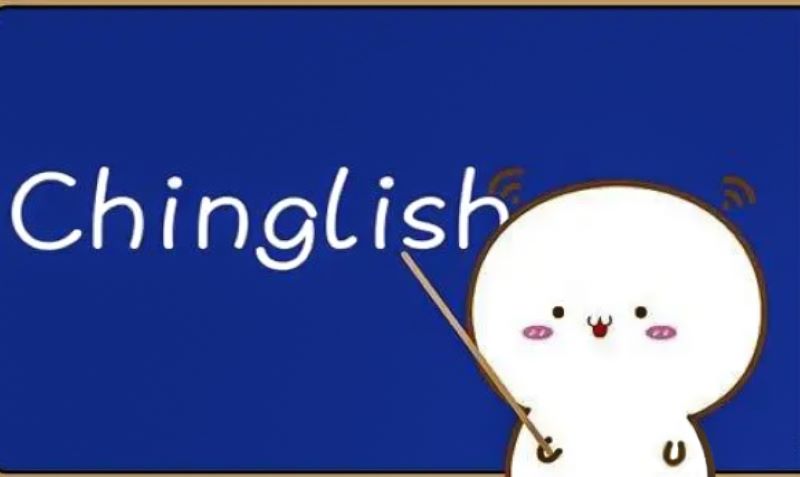In recent years, the concept of Chinglish has gradually transformed from a subject of ridicule to a globally popular cultural phenomenon. Especially with the recent popularity of the phrase “you pretty, he ugly, us wan, he frog” on foreign social media, it marks the successful transition of Chinglish from an internal form of entertainment to crossing cultural and linguistic boundaries, becoming a popular quote sought after by global netizens. This phenomenon in our daily lives and social events not only reflects the creativity of Chinese netizens in online culture, but also reveals the potential of Chinglish as a form of cultural output.
The unique charm of Chinglish
The charm of Chinglish lies in its simple and straightforward expression, often able to convey rich emotions and meanings with very few words. Although this language form is not rigid, it showcases a unique style and charm. For example, the phrase “you pretty, he ugly, us wan, he frog” accurately conveys comfort and support for the heartbroken in just eight words, while reducing emotional pain by belittling the other person. This expression is both creative and gives people a unique sense of beauty.
The beauty of Chinglish is not only reflected in its language form, but also in its cultural background and expression. Language itself is a part of culture, and the cultural connotations behind Chinglish enable it to resonate with different cultural backgrounds when expressed. For example, in this popular case, the straightforwardness and conciseness of Chinglish have made global netizens feel the unique humor and wisdom from another culture. This unique way of expression not only breaks down language barriers, but also conveys profound emotions through concise language forms.
In addition, the sense of humor in Chinglish is also an important component of its charm. This kind of humor often comes from “errors” or “non-standard” language, but it is precisely these “non-standard” expressions that make Chinglish more interesting and attractive to some extent. Netizens have turned Chinglish into an entertaining cultural phenomenon through creative use of language. The emergence of this phenomenon not only allows Chinglish to be recognized globally, but also demonstrates the diversity and creativity of language.
The collision between Chinese netizens’ creativity and global culture
The creativity of Chinese netizens occupies an important position in global internet culture. They are not only adept at using online platforms to disseminate information, but also able to quickly resonate globally through creative language expressions. In the recent popularity of Chinglish, it is the creativity of Chinese netizens that has enabled this simple phrase to spread widely worldwide.
The creativity of Chinese netizens is not only reflected in their use of language, but also in their understanding and application of online culture. In recent years, China’s online culture has gradually developed a unique expression system, which includes rich memes, proverbs, and humorous expressions. Chinese netizens are adept at combining these cultural elements and transforming them into globally appealing content through translation or adaptation. This creativity not only makes Chinglish popular domestically, but also enables it to successfully overcome cultural and linguistic barriers and spread globally.
In addition, this cultural collision is not only a one-way output, but also a two-way communication. The popularity of Chinglish reflects the global influence of Chinese culture and also showcases the acceptance and integration of global culture in Chinese online communities. This two-way flow of culture is a typical manifestation of cultural exchange in the context of globalization. Through this exchange, the boundaries between different cultures gradually blur, forming a new form of cultural integration.
In this cultural collision, Chinglish, as a unique form of cultural expression, plays an important role. It is not only a reflection of the creativity of Chinese netizens, but also a cultural phenomenon that can resonate globally. With the continuous deepening of cultural exchange, Chinglish is expected to become a “new language” in the context of globalization, building bridges between different cultures.
Flexible Use of Language Tools: Balancing Authenticity and Effective Communication
The essence of language lies in conveying information, rather than pursuing absolute “authenticity”. The popularity of Chinglish is precisely because it has achieved the expected effect in information transmission, without being confined to traditional language norms. The global popularity of Chinglish this time shows that in language communication, whether it is authentic or not is not the most crucial, the key lies in whether it can effectively convey the intended meaning.
The success of Chinglish lies not only in its simplicity and humor, but also in its ability to accurately convey emotions and information in a “non authentic” way. Traditional language learning often emphasizes “authentic” expression, but in practical communication, the authenticity of language is not the only criterion for information transmission. The popularity of Chinglish reflects people’s acceptance and recognition of the flexible use of language. On the premise that information can be accurately conveyed, the form of language becomes a secondary consideration.
In addition, the success of Chinglish also demonstrates the important role of language in cross-cultural communication. In the context of globalization, language is not only a tool for communication, but also a medium for cultural exchange. The popularity of Chinglish demonstrates its unique advantages in cross-cultural communication. Through this language form, people from different cultural backgrounds can find a common language and engage in deeper communication based on it. This phenomenon indicates that the true value of language lies in its functionality, that is, whether it can achieve effective communication in different cultural contexts.
Therefore, in future language learning and communication, more attention should be paid to the functionality of language, rather than just pursuing its formal “authenticity”. The success of Chinglish provides us with a new approach to language learning and use, which is to focus more on the actual effects of language when conveying information, rather than being confined to traditional language norms. This shift in thinking may have a broader impact on future language communication.
From Joke to Recognition: The Cultural Value of Chinglish
The cultural value of Chinglish is not only reflected in its humor, but also in its precise grasp and communication of people’s emotions in different cultural backgrounds. Once upon a time, Chinglish was considered an “incorrect” way of expression and even considered an “non-standard” language use. However, the recent popularity of “you pretty, he ugly, us wan, he frog” has changed people’s perception of Chinglish, transforming it from a subject of ridicule to a language phenomenon with cultural value.
The success of Chinglish lies in its ability to convey profound emotions and cultural connotations through concise expression. For example, the phrase that became popular this time is not only simple and clear, but also accurately expresses support and comfort for the heartbroken through comparative techniques, while belittling the other party, making this expression both interesting and powerful. The transmission of this emotion has rapidly gained recognition for Chinglish globally and sparked widespread resonance.
In addition, the cultural value of Chinglish is also reflected in its respect and tolerance for linguistic diversity. As a carrier of culture, language should essentially be diverse and flexible. The success of Chinglish demonstrates the unique value of language expression in different cultural contexts in the context of globalization. This inclusiveness and diversity enable Chinglish to spread globally and become a new cultural phenomenon.
The recognition of this cultural value demonstrates that Chinglish is not just a joke, but also a cultural expression that can have an impact on a global scale. Through this expression, people from different cultural backgrounds can find common emotions and language, thereby achieving deeper cultural exchange. The recognition of this cultural value signifies that the status of Chinglish in global cultural exchange is gradually increasing and is expected to become a new cultural phenomenon.
The Future Prospects of Chinglish
With the deepening of globalization, Chinglish is expected to play a more important role in future language communication. Its simplicity, straightforwardness, and sense of humor make it widely appealing on a global scale and able to resonate in different cultural contexts.












